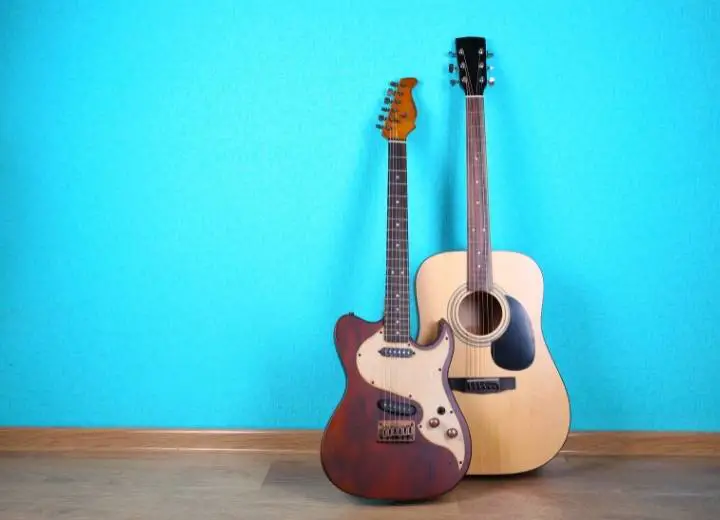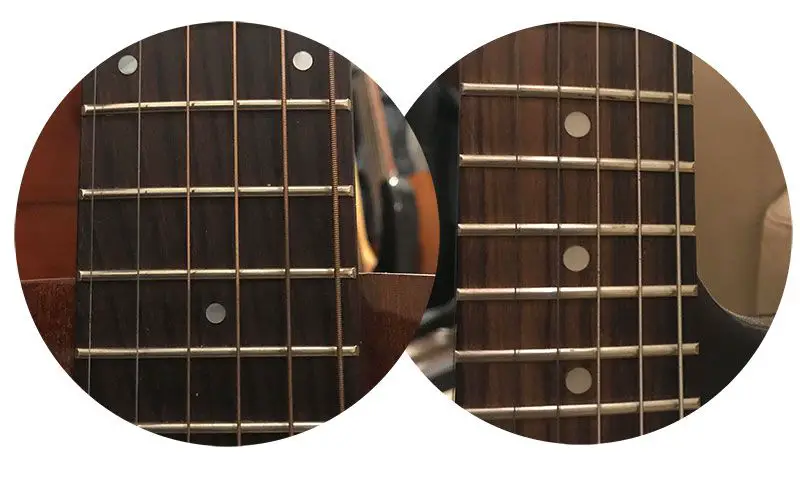
Can you use electric guitar strings on an acoustic?
Yes, it’s possible to use electric guitar strings on an acoustic guitar. And contrary to your worries, electric guitar strings can even go well with an acoustic guitar.
If your acoustic guitar strings are broken and you can’t find a replacement, try electric guitar strings.
What are the differences between electric and acoustic guitar strings?
Since electric guitar and acoustic guitar are of two different types, their strings are also different. The differences are the string material, the number of wound strings, and the string gauge.
#1. String material
The material used to make strings will decide the guitar’s tone and playability. Strings made of different materials will give different sounds.
The common materials used to make electric guitar strings are nickel, steel, and chromium alloys. The magnetic composition of these materials is suitable with electric guitar.
With acoustic guitars, people often make their strings from brass or bronze. These alloys can give the guitar more acoustically resonance. Some acoustic guitars have nylon or Nanoweb coated strings.
#2. Number of wound strings
Another difference between electric and acoustic guitar strings is the number of wound strings.
In a wound string, there is a steel core wrapping with metal windings. The wound and unwound strings are different in the rate of vibration. This leads to the difference in the pitch of notes.
Commonly, electric guitars have 3 wound strings and 3 unwound ones. Meanwhile, among 6 strings of acoustic guitars, there are only 2 unwound strings. The remaining 4 strings are wound.
Sometimes, the number of guitar strings can vary, but electric guitars often have 1 less wound string than acoustic.

The acoustic guitar with 4 wound strings (left) and the electric guitar with 3 wound strings (right)
#3. String gauge
String gauge is also an element making the difference between electric and acoustic guitar strings. The gauge decides the thickness of guitar strings. This element mainly affects the volume and resonance quality of the guitar.
A standard set of electric guitar strings will have a gauge of 9-42 or 10-46. See the table below for measure details:
| High E | B | G | D | A | Low E | |
| 9-gauge | 0.09 | 0.11 | 0.16 | 0.24 | 0.32 | 0.42 |
| 10-gauge | 0.10 | 0.13 | 0.17 | 0.26 | 0.36 | 0.46 |
Meanwhile, most acoustic guitars have the string standard gauge of 12 (light gauge) or 13 (medium gauge) and go to 53 or 56. See the measure details of both light gauge and medium gauge below:
| High E | B | G | D | A | Low E | |
| Light gauge | 0.12 | 0.16 | 0.24 | 0.32 | 0.42 | 0.53 |
| Medium gauge | 0.13 | 0.17 | 0.26 | 0.35 | 0.45 | 0.56 |
There may be some lighter or heavier gauges. However, the gauge of electric guitar strings is usually lighter than that of acoustic guitar strings.
Will electric guitar strings go well with acoustic?
Some people think that putting strings of electric guitar on an acoustic guitar can ruin the melodies.
But actually, it is fine to replace acoustic guitar strings with electric ones. The tone and pitch of notes may change a little.
When you use electric guitar strings, your acoustic guitar will produce sounds a bit like an electric one.
If you can’t find replacements for your broken acoustic guitar strings, electric guitar strings can be an acceptable solution.
Can you replace electric guitar strings with acoustic guitar strings?
Just like using electric guitar strings on an acoustic, the reverse is also possible. However, we don’t recommend replacing electric guitar strings with acoustic ones unless it is necessary.
The acoustic guitar strings are made of non-magnetic material and are usually thicker than electric guitar strings.
Thus, if you do the exchange, your electric guitar may not produce as bright and full sounds as normal.
Moreover, if the acoustic guitar strings are nylon strings, forget about putting them on the electric guitar. It will not work, and you will make no sound with a nylon string on an electric guitar.
So, if you want to make a replacement with acoustic guitar strings, remember to choose the steel core strings.
Final words
In conclusion, it is possible to use electric guitar strings on an acoustic, and vice versa.
Hopefully, through this article, you have known the difference between these two string types.
But you should use the right strings for your guitar to get the best tone and playability of the instrument.
Reference:
